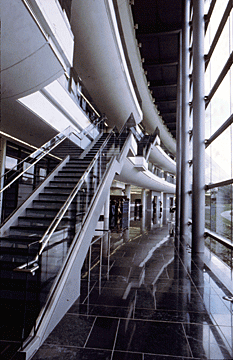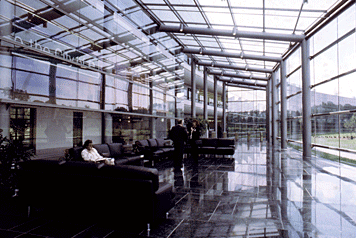 Few people realize how complicated it is to design and
construct a building, that is until they find themselves lost in a maze of
building codes, design options, contractors, zoning laws, etc. And since no
two building projects are alike, there’s no clear-cut path to follow. Few people realize how complicated it is to design and
construct a building, that is until they find themselves lost in a maze of
building codes, design options, contractors, zoning laws, etc. And since no
two building projects are alike, there’s no clear-cut path to follow.
Each architect has his or her own style, approach to design, and methods
of work. So it's important to find an architect who understands your style
and needs. Choosing an architect for the first time can be a daunting
experience, because the wrong choice can lead to bad planning, costly
delays, frustration, and, quite possibly, a loss of productivity.
Architects have the education, training, experience, and vision to guide
you through the entire design and construction process, from helping you
define what you want to build to helping you get the most for your
construction dollar.
Your building project will most likely begin with need for more space. As
most businesses grow, that need can mean the difference between success and
increased profits and the status quo and stagnation. But how does that need
get translated into square feet and three-dimensional space?
That’s what architects are trained to do–translate ideas into
three-dimensional space creatively. With a broad knowledge of design and
construction, a good architect can offer you alternatives you might never
have thought of on your own.
Architects don’t just design buildings, they create total environments
that satisfy functional needs, while, at the same time, create exciting,
dynamic spaces in which to grow a business. In the long run, an architect's
services are a wise investment, not an added cost, since a well-designed
project can be built more efficiently and economically. By working closely
with you, an architect can make changes on paper much less expensively than
later on when construction is underway.
If your project requires engineering or other design services, an
architect can coordinate this team of experts so you don't have to. And he
or she can sort out today’s complex building codes and zoning laws, help
you find qualified contractors, and visit your project site to help verify
that construction is going on according to his or her plans and
specifications.
The more thought and effort you put into choosing an architect, the
better off you’ll be in the end. First, think carefully about your
building needs and goals. Do you need more space? Where will your building
be located? What activities will be housed in the space? What’s your
budget? How about financing? Your architect will help you clarify your
goals, if necessary.
Start by assembling a list of potential architects. Find out who designed
the commercial buildings you like in your community. Get recommendations
from friends and colleagues who have worked with architects. Check to see
which architects on your list are members of The American Institute of
Architects (AIA). Members subscribe to a professional code of ethics and has
access to a variety of professional and technical resources. Contact your
local AIA chapter for lists of local member-owned architecture firms.
Call each firm on your list. Describe your project and ask if they’re
available to work on it. If they are, request literature--brochures, fact
sheets, photos of past work, and biographical material of key
personnel--outlining the firm's qualifications and experience. Look beyond
the style of this package to determine which firms have the right experience
and capabilities for your project. At this point, you should be able to
narrow your list to two or three architects to interview.
The interview is crucial because it gives you a chance to meet the people
who will design your project to see if the chemistry is right. Remember, you
want to find someone with whom you feel comfortable, since you’ll be
working with your architect for the life of the project.
Allow at least an hour for the interview. The meeting might take place in
the architect's office--helpful because you can see where the work will be
done. Or it could be held in your office--helpful because the architect can
learn more about your project and needs. Do what feels right. The architect
may show you slides or photographs of past work and describe how the firm's
experience and expertise will help you.
 During the interview, ask questions. How busy is the firm? Does it have
the capacity to take on your work? Who will handle the job? Insist on
meeting the person who will actually design your project. What is the firm's
design philosophy? How does the architect intend to approach your project?
How interested is the firm in your job? Talk about your budget and find out
the range of fees that the architect would anticipate for your project.
Before making a final selection, have the architect take you to a completed
project. Ask for references from past clients. While many architects do not
charge for the interview, some do. Before the interview, ask if there is a
fee. During the interview, ask questions. How busy is the firm? Does it have
the capacity to take on your work? Who will handle the job? Insist on
meeting the person who will actually design your project. What is the firm's
design philosophy? How does the architect intend to approach your project?
How interested is the firm in your job? Talk about your budget and find out
the range of fees that the architect would anticipate for your project.
Before making a final selection, have the architect take you to a completed
project. Ask for references from past clients. While many architects do not
charge for the interview, some do. Before the interview, ask if there is a
fee.
And speaking of fees, some charge hourly rates, others a sum per square
foot, still others a fixed fee or a percentage of construction costs.
Discuss the fee structure for your project whenever you feel it’s
appropriate. The architect may suggest a combination of the above methods.
The basis for the fee, the amount, and payment schedule are issues for you
and your architect to work out together.
Ultimately, you will choose the architect whom you trust and feel is
right for your project. Unlike buying a car, you can't see the final product
and test it out. The architect provides professional services, not a
product. The right architect will be the one who can provide the judgment,
technical expertise, and creative skills, at a reasonable cost, to help your
realize a project that fits your needs.
Be prepared to explore new and creative ideas with your architect, but be
frank about how you want the end result to feel and work. The architect will
ask you lots of questions to get a better sense of your goals and needs and
to determine if your expectations match your budget. The architect may
suggest changes based upon knowledge, experience, and your budget. After
thoroughly discussing your functional requirements, the architect will
prepare a statement outlining the scope of your project. During the next
step, your program will be realized.
If at any time in the design process you feel uncomfortable, discuss your
concerns with your architect. You don't want your architect to control the
project to the point that the building is no longer yours. But you also want
to be careful not to restrict your architect so much that you’re not
getting your money's worth in terms of design creativity.
Once you have found the architect, you’re ready to prepare a written
agreement, concerning the scope of work, services, schedule, construction
budget, and architect's fee. Although you can have your lawyer draw up an
agreement, the AIA offers a variety of standard contracts which are used
throughout the industry.
|
